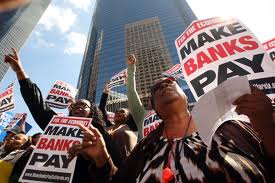According to many stock market analysts and researchers of various investment activities that imply a certain level of risk, the collapse of mortgage-backed securities in the United States a few years ago was the result of a zero-sum game coming to an end.
 According to many stock market analysts and researchers of various investment activities that imply a certain level of risk, the collapse of mortgage-backed securities in the United States a few years ago was the result of a zero-sum game coming to an end. In the field of game theory, studied by many mathematicians, a zero-sum game is a situation that calls for wealth to be transferred from one set of players to another. The game keeps going until some players run out of wealth.
According to many stock market analysts and researchers of various investment activities that imply a certain level of risk, the collapse of mortgage-backed securities in the United States a few years ago was the result of a zero-sum game coming to an end. In the field of game theory, studied by many mathematicians, a zero-sum game is a situation that calls for wealth to be transferred from one set of players to another. The game keeps going until some players run out of wealth.
A zero-sum situation is at the heart of a recent feature article by Bob Ivry, published in Bloomberg Businessweek. The article chronicles the mortgage zero-sum game played by a Memphis woman who lost her home to foreclosure and Thomas Marano, a former Bear Stearns subprime mortgage-backed securities trader who is the CEO of the failed and bankrupt home lender ResCap. While Bear Stearns and ResCap will always be remembered by their abrupt and catastrophic exit from the markets, Mr. Marano stands as a true winner of the subprime mortgage zero-sum game and the Memphis homeowner, Rebecca Black, is one of the many losers.
Temporary Winners
The article illustrates one important feature of the subprime mortgage game in the early years: Everyone seemed to be winning. Mrs. Black, who today earns the same $24K per year salary as she did in the early 21st century, qualified for the American dream of homeownership thanks to Mr. Marano's masterful performance at Bear Stearns. Prior to being labeled as toxic debt, subprime mortgage bonds were marketed to institutional investors as a lucrative, sure-fire investment.
Mrs. Black was not the only homeowner in Memphis who entered the subprime game and eventually lost her home. A study by the Center for Responsible Lending revealed that during the subprime frenzy, from 2004 to 2008, lenders were more likely to offer risky subprime mortgages to African American borrowers in cities like Memphis. Since 2009, more than four million Americans have lost their homes to foreclosure. They were all temporary winners who lost in the end.
The True Winners
The widening gap between the rich and poor in the United States illustrates the zero-sum game on a grand scale. The top one percent targeted by the Occupy Wall Street movement saw their wealth climb by 5.5 percent in 2011. In contrast, those households who bring in less than $100,000 per year saw their income diminish by 1.7 percent. This represents 96 million families, or 80 percent of all Americans.
The U.S. economy has expanded 7.3 percent since 2009, but only for people like Mr. Marano, who took home $8 million last year as ResCap wiped billions of dollars in bad loans from their books and missed unsecured debt payments in the amount of $20 million. Mr. Marano, along with many other Wall Street players who are still profiting from the housing bubble and the mortgage meltdown, is one of the true winners.



